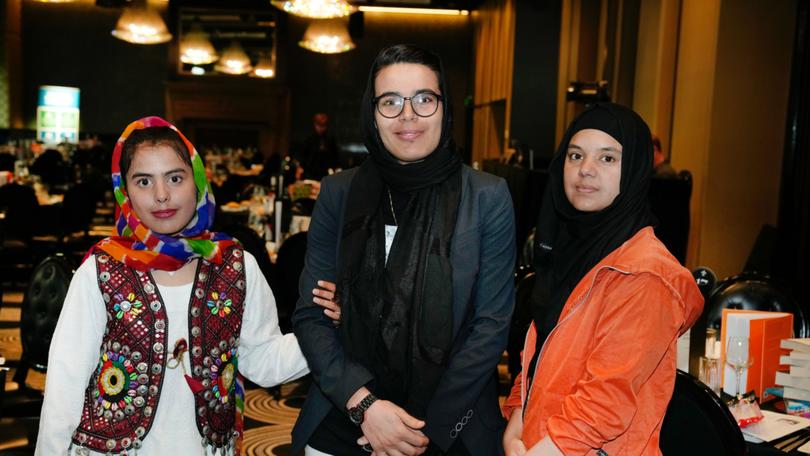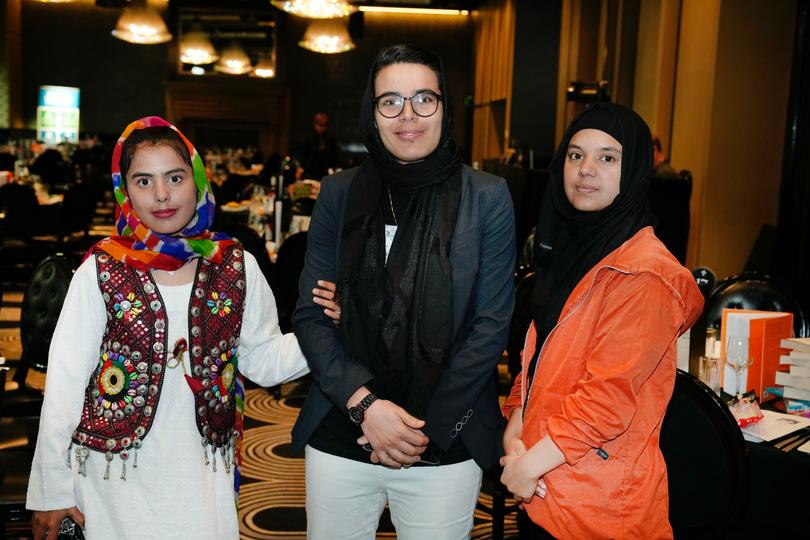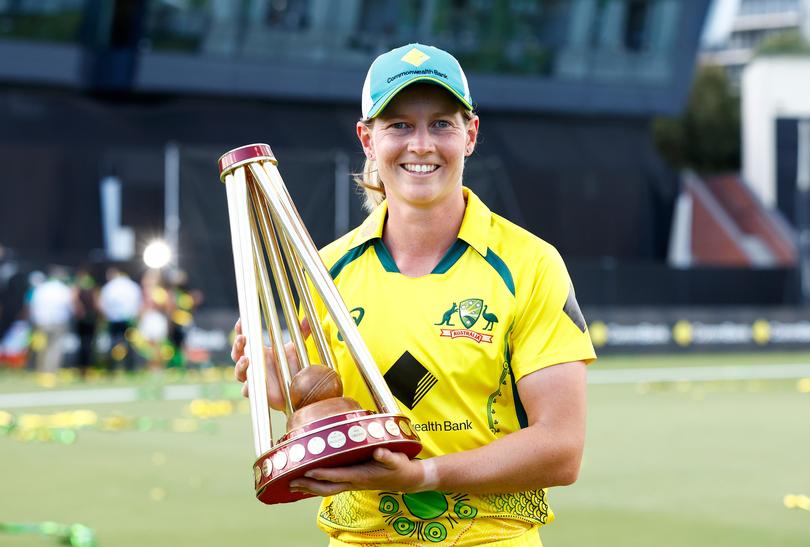Justin Langer: The story of three young female Afghan cricketers that brought a tear to my eye
When the Taliban took over Afghanistan in 2021, the aspirations of three young cricket players were shattered. They were no longer allowed to play the game they love and lost access to many pleasures in live.

Her birth name is Benafsha Hashimi and she is a five-foot-nothing teenage girl from Afghanistan.
Fourth among eight children, her mother is the widow of an Afghan special forces soldier. In the early hours of August 21, 2021, Benafhsha and a group of Afghanistani cricketers, including her sister Safia, and her teammate Nilab Stanikzai, escaped their country.
A few weeks ago, I met these three remarkable young ladies at a charity dinner in Sydney. Their story brought a tear to my eye.
Sign up to The Nightly's newsletters.
Get the first look at the digital newspaper, curated daily stories and breaking headlines delivered to your inbox.
By continuing you agree to our Terms and Privacy Policy.Speaking at the event run by the LBW Trust (Learning for a Better World), you could hear a pin drop as the girls told their story.
The LBW Trust believe that everyone in the world deserves an education, every student deserves an opportunity to realise their potential, and that no one should be immune to having the chance to create their own future.
This vision was brought to life by the stories of these three extraordinary young women.
Not that long ago, Benafsha and scores of girls just like her dreamed of playing in World Cups and Olympic Games. At the very least they were driven and excited about the possibility of climbing the international cricket ladder, just as their male counterparts had.
However any such dreams were shattered following the 2021 Taliban offensive and the re-establishment of an Islamic emirate, which includes the Taliban’s ban on women’s sport.
Benafsha’s nickname is ‘Choti Shaitan’, which in English translates to ‘Little Devil’.
When a teenage girl says, We’re not afraid of guns or bombs, we’ve grown up with them. But floggings — it is merciless, vicious, tingles run up and down your spine — prickles of sadness and disbelief.
When you meet her and listen to her talk you would think butter wouldn’t melt in her mouth. Diminutive in stature, she giggles and screams with delight like many teenage girls do. Dressed in traditional garb, her bright clothes light up the room like her smile does. She is cheeky, funny, and the eternal extrovert.
The nickname ‘Little Devil’ seems the opposite of what we see on the surface, but when she gets serious and starts talking about what has been taken away from her, how she loves cricket and her teammates, and what she thought of the treatment of Afghan women, you can hear an intensity and courage well beyond her years.
When a teenage girl says, “We’re not afraid of guns or bombs, we’ve grown up with them. But floggings — it is merciless, vicious”, or “If it is a crime to be born a girl, then say so openly”, tingles run up and down your spine. These aren’t shivers of delight, but rather prickles of sadness and disbelief.
In contrast to ‘Choti Shaitan’s’ fearless and passionate pleas for support, her sister Safia just stood by her side and said little. She seemed very shy, and you could see in her face the impact the last few years have had on her life. As a father of four daughters, this was heartbreaking for me to watch.
A little older, Nilab, was gracious, strong, resolute. Her face was wise, but no less sad. How could it not be?

On August 21, 2021 when the Taliban took over their country, the aspirations of these three young women, and many more, were shattered. Not only were they forbidden to play the game they loved, but education, music and the things we take for granted, were no longer an option to them.
For years Benafsha had to hide her love for the game from her family, particularly her mother, who saw no sense in her daughter playing a sport like cricket.
Traditions, and law, forbade such activities. But through perseverance and persistence — often hidden in secrecy — her desires to play were finally recognised.
Inspired by the feats of male role-models, she began playing cricket at five. But as the years went on, the barriers to her progress grew deeper and deeper.
With every knock back, she refused to stop playing. Rather than succumbing to the deterrents, her desire to persist only grew — albeit, there were times when her fears almost beat her yearning to stay the course.
When she was told she couldn’t play in the streets anymore, she would not be swayed. She started pestering of the Afghan women’s cricket manager. Daily calls to check when women’s practice would begin — and secret support from her brother — meant she found a way to turn up at every opportunity.
Even the security guards got tired of mocking her for waiting for hours for a chance to train with the big girls. Rocks being thrown at her to deter her from her frequent travels to the cricket ground, only swelled her determination.
Her resolve was eventually rewarded, and cricket in Afghanistan was becoming a reality for Benafsha. In November 2020, the Afghanistan Cricket Board awarded central contracts to 25 players in their bid to form a national team to take part in ICC tournaments.
Official skills, fitness camps, as well as the national team trial camp were set up. The dream was becoming a reality. Then, like the flick of a switch, it was all extinguished. The dream was gone. Just like that. Taliban rule put an end to it all.
The light of opportunity and freedom was gone. But thanks to the support of a group of Australian social workers and human rights’ activists, many of those girls were able to escape and now live in Canberra and Melbourne.
Last season, Benafsha and some of her teammates played for Tuggeranong Valley Cricket Club in Canberra and they travelled to Fiji with ‘Cricket Without Borders’.
Being able to play without restraints must feel like such a joy, or as the ‘Little Devil’ says: “When I’m playing cricket, I forget everything.”

The reason I’m writing about the plight of these aspiring Afghanistan women’s cricketers is that last weekend I watched my 18-year daughter celebrate her birthday with a group of her friends. Having just finished their final Year 12 exams, the atmosphere was one of total freedom. Singing and dancing to Sweet Caroline, American Pie and Bohemian Rhapsody, they all looked so happy and free.
Their main worry that night was whether the security guards would let them into the nightclub after checking their IDs.
Contrast that to these other young women of similar age, standing petrified at checkpoints and borders, being mocked by Taliban soldiers; mainly because they were female, trying to escape from the brutality of their own country.
Two worlds so vastly different.
Then I watched as one of Australia’s greatest ever players, Meg Lanning, announced her retirement from the international game.
A beacon of inspiration for so many, Meg rose to the top of the cricketing world and enjoyed opportunities that others can aspire to and dream about, with confidence of a pathway of hope. Meg is a legend who has inspired so many.

And of course, Glenn Maxwell’s double-century last week, one of the most talked about sporting stories of the last decade, brilliant as it was, it was made against Afghanistan.
Earlier this year Cricket Australia withdrew from the men’s three-match ODI series against Afghanistan following the announcement by the Taliban of restrictions on women’s rights, including education, sporting, recreational and employment opportunities.
This decision was met with international controversy, but I must say, having seen and heard first-hand from Benafhsha, Safia and Nilab, I understand the decision back then.
Behind the mayhem and jubilation of Maxwell’s brilliance was another story. That is one of the sisters, friends, cousins of Australia’s dejected opponent that night, who aren’t allowed to play the game because of the sex they were born.
Alyssa Healy, the current captain of the Australian women’s cricket team, said recently: “It’s not women’s sport, it’s just sport.”
With this in mind, let’s hope organisations like the International Olympic Committee and the International Cricket Committee can find a way to include the Afghan women’s team into the newly appointed Olympic Program or the international cricket itinerary in the future.
This will take courage and leadership, but they have been shown the way by the ‘Little Devil’ and her friends.
